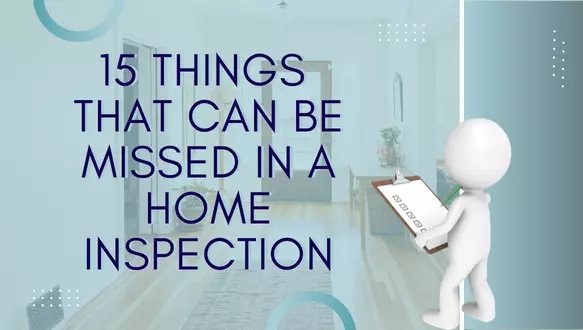
15 Things Home Inspectors Could Miss
Even though home inspections cover just about everything in the home that could cause an issue, they can't look inside walls, under floors, or tear the house apart to find each and every potential issue. Here are the problems that they're most likely to miss. 1. Pests Home inspectors look for evidence of pests, but if the infestation isn’t widespread or is hidden, they won’t see it. 2. Lead paint Inspectors don’t take paint samples to check the composition. 3. Toxic mold Inspectors look for signs of mold, but if it’s in the walls, they probably won’t find it. 4. Asbestos If asbestos isn’t exposed in the attic or basements, inspectors might not find it in the rest of the house. 5. Radon gas Radon causes lung cancer, and it’s colorless, odorless, and tasteless. Inspectors won’t find it unless they test for it. 6. Swimming pool problems In many markets, inspecting the pool isn’t part of the home inspection package. 7. HVAC problemsInspectors are going to check the heating and cooling, but if it’s very hot or cold outside, these could be difficult to test thoroughly. 8. Roof leaks Home inspectors try as hard as possible to detect roof leaks, but depending on how tall the home is, this could be challenging. 9. Appliance malfunctions The inspector will make sure these turn on and off and drain properly, but there’s a lot they could miss in terms of appliances. 10. Floor cracks under carpeting Without special permission, the inspector won’t be able to look under the carpet and could miss signs of foundation problems. 11. Wells or septic systemsIn some areas, this is a specialized inspection you’ll have to order to make sure your systems are working. 12. Chimney issuesInspectors will look for cracks and check the flue, but this is a cursory check, not an in-depth examination. 13. Radiation Water, electromagnetic exposure, and other sources can generate radiation that’s harmful to your health. 14. Damaged sewer linesIf a sewer line is partially blocked or is damaged but is still working, the inspector might not notice there’s an issue. 15. Grading problems The grading of the soil around the home should divert water away from the foundation, or it can cause problems.

9 Tips for Assessing Your Home's Value
As a homeowner, it's perfectly natural to wonder how much your house is worth. Here are nine things to consider when you're trying to figure out your home’s current value. Look at your property tax bill Your property tax bill is a good jumping-off point. In most states, homes are assessed for taxes every five to seven years. But an assessment isn’t the final word on property value; it’s based on your home’s most recent appraised value. Examine homes that have sold recently in your neighborhood To pinpoint a home's value, most professionals use "comps” — this is just a term for homes that are comparable to yours that have sold recently. Find some comps yourself by looking up homes that have recently sold in your area or neighborhood. The recently sold homes should be as, well, comparable to your house as possible for this to be a valuable exercise. Consider inventory In some markets where there just aren't very many homes for sale, it might not even matter that much if your house is comparable to others that have recently sold. Those markets are few and far between, but it's still a smart idea to look at how many homes are for sale in terms of total inventory and then use that information to determine how much your own house might be worth. Use an online tool Although online tools for calculating your home's value are everywhere, they aren't always accurate. A robot or algorithm hasn't actually seen your house; they haven't walked through it to determine whether the flooring, finishes, appliances, and other details are above the market average or below market average. Nonetheless, if you want a quick answer, sometimes an online tool is the fastest way to get at least a ballpark range. Determine price per square foot in your area Another way to determine your home's value is to look at the average price per square foot in your area, take your own home's square footage, and do a little bit of math. But price per square foot can be tricky, so make sure you're being smart when you use it to calculate your own home's value (for example, appraisers won’t include your basement in your home’s square footage, or gross living area). Consider the home's age, the lot size, and the location The house itself is just one part of the valuation equation, although it's an important one. Even if your house has increased in value since you bought it, just like any other physical asset, homes degrade over time. The land that the house sits upon is also critical when you're trying to figure out how much the house is worth, both in terms of its exact location and also in terms of how much land there is. Be realistic about how your home measures up Everyone wants to believe that the house where they've been living, breathing, and making memories is one of the best homes in the neighborhood. But ultimately, your house is only worth what a buyer would pay to own it, and delusions about how special it is could undercut your home's actual worth if you end up overpricing it. Order a BPO or a CMA A BPO is a broker price opinion, and a CMA is a comparative market analysis; you can get either of these documents from a licensed real estate agent, who likely knows the market very well. After all, they list and sell houses every day, so they probably have a pretty good idea of what yours is worth. Talk to a professional A real estate agent or broker isn't the only person who can assess your home's value; you can also go straight to an appraiser and order an appraisal but be aware that it could take several weeks and cost a few hundred dollars to get their professional opinion. So an agent or broker might be your best option if you want to save money and you're not interested in selling your house immediately.

21 Things A Real Estate Agent Should Do For You
A really good real estate agent will manage these tasks and activities for a client. How does yours measure up? For Buyers: Ask you about homeownership needs and hopes Recommend a mortgage broker Get you pre-approved Talk about schools Give you feedback on neighborhoods Help you find a home Help you pick an inspector Attend the home inspection Attend the appraisal Stay on top of the mortgage Offer help finding contractors For Sellers: Price your home correctly Market the home well For Both: Negotiate an offer Negotiate home inspection repair requests Communicate, communicate, communicate Help you prepare to buy or sell Tie up any loose ends Help you manage emotions Follow up to see how the move went
Categories
Recent Posts










